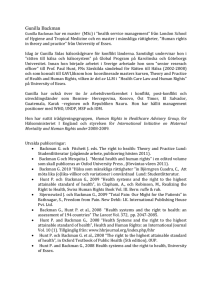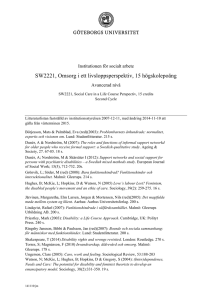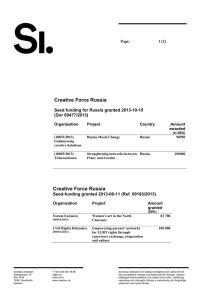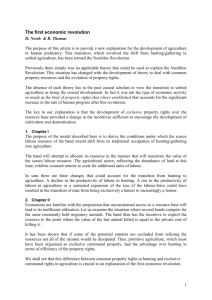2014-02-19 Reflections upon the Draft prepared ... the Rights of Persons with ...
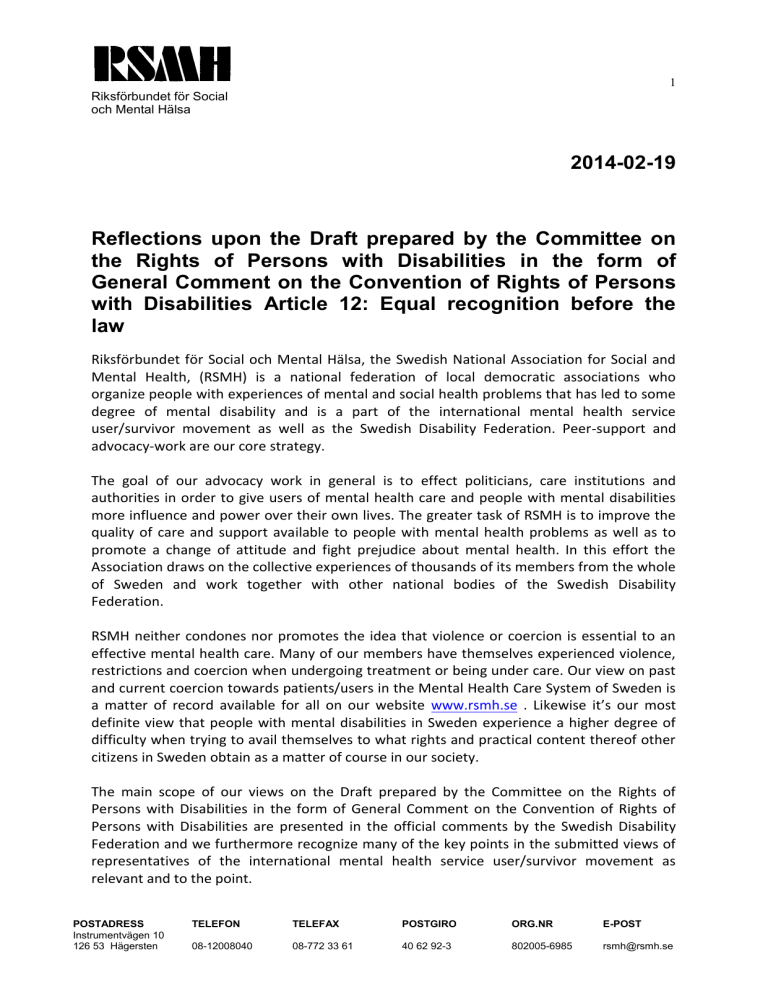
1
Riksförbundet för Social och Mental Hälsa
2014-02-19
Reflections upon the Draft prepared by the Committee on the Rights of Persons with Disabilities in the form of
General Comment on the Convention of Rights of Persons with Disabilities Article 12: Equal recognition before the law
Riksförbundet för Social och Mental Hälsa, the Swedish National Association for Social and
Mental Health, (RSMH) is a national federation of local democratic associations who organize people with experiences of mental and social health problems that has led to some degree of mental disability and is a part of the international mental health service user/survivor movement as well as the Swedish Disability Federation. Peer-support and advocacy-work are our core strategy.
The goal of our advocacy work in general is to effect politicians, care institutions and authorities in order to give users of mental health care and people with mental disabilities more influence and power over their own lives. The greater task of RSMH is to improve the quality of care and support available to people with mental health problems as well as to promote a change of attitude and fight prejudice about mental health. In this effort the
Association draws on the collective experiences of thousands of its members from the whole of Sweden and work together with other national bodies of the Swedish Disability
Federation.
RSMH neither condones nor promotes the idea that violence or coercion is essential to an effective mental health care. Many of our members have themselves experienced violence, restrictions and coercion when undergoing treatment or being under care. Our view on past and current coercion towards patients/users in the Mental Health Care System of Sweden is a matter of record available for all on our website www.rsmh.se
. Likewise it’s our most definite view that people with mental disabilities in Sweden experience a higher degree of difficulty when trying to avail themselves to what rights and practical content thereof other citizens in Sweden obtain as a matter of course in our society.
The main scope of our views on the Draft prepared by the Committee on the Rights of
Persons with Disabilities in the form of General Comment on the Convention of Rights of
Persons with Disabilities are presented in the official comments by the Swedish Disability
Federation and we furthermore recognize many of the key points in the submitted views of representatives of the international mental health service user/survivor movement as relevant and to the point.
POSTADRESS
Instrumentvägen 10
126 53 Hägersten
TELEFON
08-12008040
TELEFAX
08-772 33 61
POSTGIRO
40 62 92-3
ORG.NR
802005-6985
E-POST rsmh@rsmh.se
2
Riksförbundet för Social och Mental Hälsa
However we’d like to address some specific concerns provoked by certain parts of the discourse of the Draft prepared by the Committee on the Rights of Persons with Disabilities in the form of General Comment on the Convention of Rights of Persons with Disabilities
Article 12: Equal recognition before the law.
There are some question, already raised by the Law Society of Scotland among others, whether the existing draft cohesively recognize and support the view that to the extent that people, in each individual case, are not in fact capable of acting and deciding for themselves, and of their own accord for and by themselves safeguarding their welfare and interests, and of exercising their rights, it is a fundamental breach of their human rights not to provide appropriate mechanisms to ensure that their interests are safeguarded and their rights exercised.
At the risk of misinterpretation of key elements of the publicized line of reasoning by the
Committee we are drawn to the conclusion that in the Committee’s view there can never be any acceptable form of substitute decision-making regimes under which a larger portion of those limited by it have a disability than the correlating ratio in society as a whole would indicate as par.
As stated in this and other contexts RSMH firmly believe that supported decision-making in general is the better option to accommodate and support the individual’s rights both under the convention and in a practical sense. With reference to legal capacity (i.e. legal agency since legal standing has been a moot point in Sweden since 1989) the legal institute of god
man in Sweden could do with a more professional makeover as well as a more structured national review and censorship but does in its present form deliver the fundamental aspects of supported decision-making.
There are however, in our view, under some circumstances an unacceptable level of risk for the individual with seriously diminished mental capacity in the exercise of full agency to the point of self-harm or the right to veto necessary decisions when periculam in mora.
The situations in which a person de facto doesn’t have the ability to fully appreciate the consequences of their own action or inaction and thereby run not inconsiderable risks of physical harm or loss of property and means of support need to be addressed by society. In such few and exceptional cases – where a person risk making a decision that is considered to have severe negative consequences (outcome approach) due to that said person’s decisionmaking process are deficient to a certain degree (functional approach) when considered in a non-discriminatory fashion by a judicial body supported by adequate medical expertise – we support the Swedish legal institute of förvaltare as the lesser of two evils. Note that we still oppose a simplistic functional approach without reference to the factual context of the individual.
POSTADRESS
Instrumentvägen 10
126 53 Hägersten
TELEFON
08-12008040
TELEFAX
08-772 33 61
POSTGIRO
40 62 92-3
ORG.NR
802005-6985
E-POST rsmh@rsmh.se
3
Riksförbundet för Social och Mental Hälsa
That a förvaltare may be appointed in the case of individuals who, due to illness, mental disturbance, debilitated health or a similar condition are not in a fit state to care for themselves or their property (Chapter 11, Section 7 of the Act on The Children and Parents
Code) should be viewed in its context. Since a förvaltare may not be appointed if it is deemed sufficient that the individual is being assisted by a god man or in some other less intrusive manner, i. e. by a relative or an authorized legal representative. The individual may no longer take decisions on matters that fall under the administratorship of the förvaltare but do otherwise retain the right to decide over his or her personal affairs.
It is not, in our view, a good long term solution and should in each individual case be dismantled as soon as circumstances change. Safeguards to that effect exist in the Swedish legal system. That these could and should be enhanced does not, in our opinion, validate that the institute of förvaltare should be abolished. We do not in other words find that the right of persons with disabilities to legal capacity is restricted on an unequal, discriminatory, basis compared to others through the Swedish legal institute of förvaltare.
Jimmie Trevett
President
RSMH
POSTADRESS
Instrumentvägen 10
126 53 Hägersten
TELEFON
08-12008040
TELEFAX
08-772 33 61
POSTGIRO
40 62 92-3
ORG.NR
802005-6985
E-POST rsmh@rsmh.se
